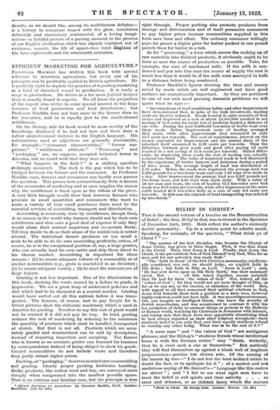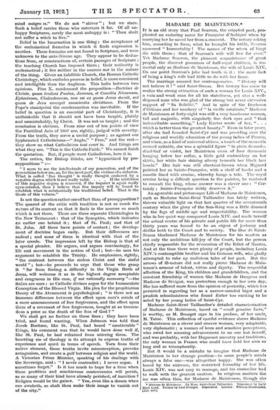BELIEF IN CHRIST.* This is the second volume of a
treatise on the Reconstruction of Belief ; the first, Belief in God, was reviewed in the Spectator of December 24th, 1921. Both reflect the author's curiously double personality. Up to a certain point he admits much. Speaking, for example, of the question, " What think ye of Christ ? " :- " The answer of the first disciples, who became the Church of Jesus Christ, was given in three stages. First, it was that Jesus is the Christ. Thee, that Jesus is Lord. Finally, that Jesus, the Christ, is the pre-existent Son of God, Himself very God, Who for us men and for our salvation was made flesh."
"The faith in Jesus' of the first Christian community, intellectu- ally considered, was not, we should judge, an explicit faith in His deity ; but faith in Him as Lord. ' Jesus is Lord' ; and4 He has sent down upon us His Holy Spirit,' was their summary creed. But . . . all this, taken together, means certainly that He had for them ' the values of God.' Not, indeed, all the ' values of God ' ; for they would not yet have thought of Him, as far as we can see, as the creator, or sustainer, of the world. But, with regard to all that concerned their spiritual relations to God, Jesus held towards them such a position as a mere man, however highly endowed, could not have held. It was an ambiguous moment. One can imagine an intelligent Greek, who knew the severity of Jewish monotheism, and was accustomed to contrast it with the lax ascription of deity to eminent things or persons in the Hellenic or Roman world, watching the Christians in Jerusalem with interest, and taking note that these Jews were apparently abandoning what he had always regarded as their chief religious stronghold—their stubborn belief in one only God, and their equally stubborn refusal to worship any other being. What was to be the end of it ? "
" A mere man " and " the values of God " are ambiguous phrases ; and the Bishop's "studious friends whose intellectual home is with the German critics " may " think, wickedly, that he is even such a one as themselves." But suddenly they will find themselves up against a blank wall of Anglican prepossession--penitus toto divisor ark. Of the cursing of the barren fig tree—" I do not feel the least inclined either to doubt the fact, or to apologize for it " ; of a modest and not unobvious saying of Mr.Emmet's—"Language like this makes me shiver " ; and " I fail to see what right men have to treat the belief in evil spirits and their nativity . . . as error and delusion, or as childish fancy which the mature • Belief is Christ. By Bishop Gore. London: Murray. [75. mind outgro rs." We do not " shiver " ; but we stare. Such a belief carries those who entertain it far. Of all un-
happy Scriptures, surely the most unhappy is : " Thou shalt not suffer a witch to live."
Belief in the Incarnation is one thing ; the acceptance of the ecclesiastical formulas in which it finds expression is another. These formulas are not found in Scripture, and were unknown to the ante-Nicene age. They appear to be deduc- tions from, or constructions of, certain passages of Scripture : the teaching Church has imposed them ; their authority is ecclesiastical ; it lies neither in the sources nor in the nature of the thing. Given an infallible Church, the Roman Catholic Christology, which excludes process in belief, is more consistent and intelligible than the Anglican. This halts between two opinions. Pius X. condemned the proposition—Doctrina de Christi!), quam tradunt Paulus, Joannes, et Concilia Nicaenum. Ephesinum, Chalcedonense, non est ea quam Jesus docuit, sed pant de Jesu concepit conscientia christi,ana. From the Pope's standpoint the condemnation was inevitable. If the belief in question is an essential part of Christianity, it is unthinkable that it should not have been taught, plainly and unmistakably, by Christ. It was not so taught ; and the conclusion is obvious. From nine out of ten points of view the Pontifical Acts of 1907 are, rightly, judged with severity.
From the tenth, they serve a useful purpose ; as against our hyphenated Catholicisms—" Anglo," " Free," and the rest—
they show us what Catholicism tout court is. And things are what they are. "This is the Catholic Faith." We cannot finish the quotation. But, if people want Catholicism, here it is. The critics, the Bishop thinks, are " hypnotized by pre- suppositions " :- " I seem to see the intellectuals of my generation, and of the generations below me, as, for the most part, the victims of a delusion. What is called `free thought' is really thought enslaved by a negative dogma which is not really valid. . . . If the inhibition of this negative dogma is removed, if the inquirer is again really open-minded, then I believe that free inquiry will be found to establish what is substantially the traditional belief. That is the thesis of this volume."
Is not the question rather one of fact than of presupposition? The quarrel of the critic with tradition is not so much the nature of its content as that it finds in the sources so much which is not there. There are three separate Christologies in the New Testament : that of the Synoptics, which indicates an earlier one behind it ; that of St. Paul; and that of St. John. Al) three have points of contact ; the develop- ment of doctrine began early. But their differences are radical ; and none of them is identical with that of the
later creeds. The impression left by the Bishop is that of a special pleader. He argues, and argues convincingly, for
life and movement in the notion of God ; but—he uses his argument to establish the Trinity. He emphasizes, rightly, " the contrast between the sinless Christ and the sinful world " ; but—he proceeds to urge that those who grasp it " far from finding a difficulty in the Virgin Birth of Jesus, will welcome it as in the highest degree acceptable and congruous in His case, if not rationally necessary "—the italics are ours : so Catholic divines argue for the Immaculate Conception of the Blessed Virgin. His plea for the propitiation
theory of the Atonement is psychological ; " is there not an immense difference between the effect upon men's minds of a mere announcement of free forgiveness, and the effect upon
them of a covenant of free forgiveness, bought at so tremen- dous a price as the death of the Son of God ? "
We shall get no further on these lines ; they have been tried, and found wanting. When Johnson was told that Jacob Boehme, like St. Paul, had heard " unutterable " things, his comment was that he would have done well if, like St. Paul, he had refrained from uttering them. The besetting sin of theology is its attempt to express truths of experience and spirit in terms of speech. Torn from their native element, those truths invite misconception, provoke antagonism, and create a gulf between religion and the world. A Victorian Prime Minister, speaking of his dealings with the Sovereign, said : " I never contradict ; I never argue. I sometimes forget." Is it too much to hope for a time when these profitless and mischievous controversies will perish, as so many of their kind have already perished, of inanition ? Religion would be the gainer. " Yea, even like a dream when one awaketh, so shalt thou make their image to vanish out
of the city."















































 Previous page
Previous page